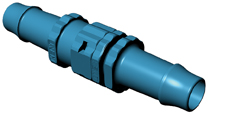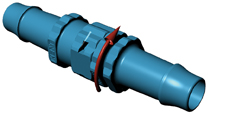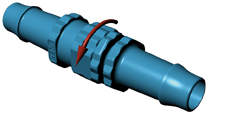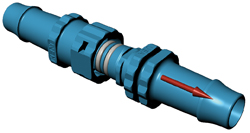|
PPG Accessories:
Kiting WingsBig Bag Stuff Sack Ozone Easy Bag Ozone Easy Bag Light Red Ozone Easy Bag Light Blue Easy Off Prop Hub Kit Flotation Systems Propellers Helmets Harnesses Windsocks Carabiners & Links Pop-Up Speed Bar Strobe Lights Temp Gauge Tach/Hour Gauge Moster Cooling Shroud Fuel Quick Coupling Jiggle Siphon for Fuel PPG Trike Line Holders Used Flying Machines
(Price includes both the Male and Female Couplings) |
KENT Systems Quick Couplings
KENT Systems Quick Couplings are extremely easy to use. To connect, the user inserts the male quick coupling into the female and turns clockwise a quarter turn.
Disconnecting the quick couplings is just as easy as coupling them. The user simply reverses the process and turns the male quick coupling counterclockwise one-quarter turn.
Through customer testing, we found our quarter turn quick coupling is more intuitive to users than push button or collar designs. We found when users approach quick couplings they are not familiar with, most people instinctively twist the quick couplings in an attempt to disconnect them. We used this finding as the foundation to our quick couplings design. As a result, we have a quick couplings that is easier to use.
Key features include:
• Internal Valve
• Shuts off flow when disconnected
• For 1/4" fuel line
| Connecting Quick Couplings | Disconnecting Quick Couplings | |||||

|

|
|||||
 To connect: Insert the male Quick Couplings into the female |
 To disconnect: |
|||||

|

|
|||||
|
Rotate one quick coupling a 1/4 turn clockwise |
Turn one quick coupling 1/4 turn counter-clockwise |
|||||

|

|
|||||
|
The quick couplings are secured into place |
Pull the Quick Couplings apart |
|||||
DesignThe KENT Systems Shut-Offquick coupling is offered in a male or female design and requires no additional steps to activate. The Shut-Off valve opens with the same 1/4 turn that locks the quick coupling into place and comes standard in light blue. Please contact KENT Systems for custom color options. FunctionThe Shut-Off quick coupling prevent fluid or gases from escapingthe quick coupling while you are connecting the product. The O-Ring creates a seal and the locking lugs hold the quick couplings together before the Shut-Off valve begins to open. This makes for an easy connection even in high pressure applications. |
|
Working Under PressureKENT Systems quick couplings also work better than other quick couplings at high pressures. The secret to this advantage lies with our patented cam action shut-off valve. When connecting our quick couplings, the locking lug holds the product together and a seal is created before the valve begins to open. As a result, the user is not forced to overcome the line pressure or messy leaks when connecting the quick couplings. |
Dead VolumeDead volume is the amount of fluid trapped between the valves of a quick coupling when it is disconnected. When working with messy or hazardous liquids, it’s important to look for a quick coupling with low dead volume. You are about to discover why KENT Systems is the best choice when it comes to this sort of application.
|
|
|
If you take a look at the video you can see the difference between our quick coupling and the push button quick coupling. Both are a ¼ inch shut off coupling. Inside each coupling is dead volume, and as you can see our quick coupling produces significantly less spillage than our competitor. Also, our competitors quick coupling even splatters when connecting, something our coupling does not do. Watch our dead volume video and enjoy! |
|

